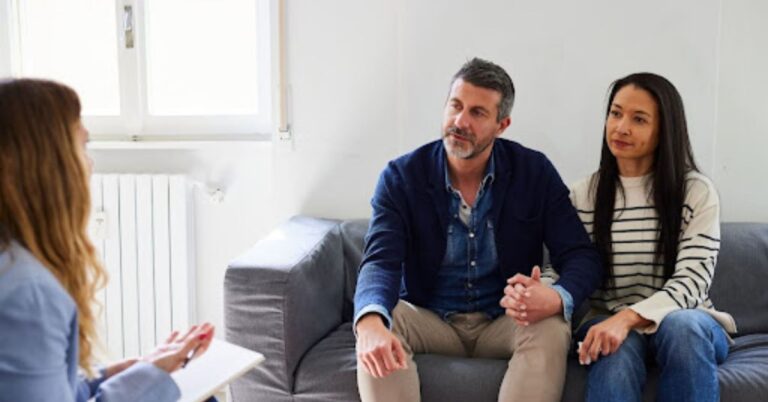Strong relationships don’t happen by accident — they’re built through communication, trust, and emotional awareness. When issues arise, therapy provides a structured, safe space to unpack problems, learn new tools, and reconnect. Even the strongest couples face conflict, miscommunication, or disconnection over time. Life gets busy, emotional intimacy fades, and unresolved stress builds into resentment. The idea that “love should be easy” is more of a fairytale than a fact.
Table of Contents
- Why Relationships Require Intentional Work
- When to Consider Couples Counselling
- Common Relationship Challenges Therapy Can Help With
- What to Expect from Couples Therapy
- Emotionally Focused Therapy: Rebuilding Emotional Bonds
- Gottman Method: Evidence-Based Tools for Connection
- Cognitive Behavioural Therapy in Relationships
- Improving Communication Patterns
- Addressing Anger, Resentment, and Emotional Regulation
- Supporting Mental Health Within the Relationship
- Navigating Life Transitions Together
- The Role of Individual Therapy in Couples Work
- Rebuilding Trust After Betrayal or Conflict
- Developing Emotional Intimacy and a Deeper Connection
- Healthy Conflict vs. Communication Breakdowns
- How Therapy Encourages Personal Growth in Relationships
- Creating a Healthier Future Together
- Online Counselling Options for Calgary Couples
- Taking the First Step Toward Relationship Wellness
Why Relationships Require Intentional Work
What does love really need? Intention, emotional investment, and the right tools. Couples counselling offers all three. Whether you’re facing long-term conflict, life transitions, or just want to deepen your bond, Calgary couples counselling can help you grow together, not apart.
When to Consider Couples Counselling
Therapy isn’t just for relationships on the brink. Calgary couples from all walks of life seek counselling to:
- Address communication breakdowns
- Navigate life transitions like becoming parents or relocating
- Resolve ongoing challenges or conflicts
- Rebuild trust after betrayal
- Deepen intimacy and connection
- Explore new dynamics, including career change, aging, or health issues
If you’re feeling stuck, distant, or frequently misunderstood, counselling can bring clarity and relief.
Common Relationship Challenges Therapy Can Help With
Some of the most frequent issues addressed in couples therapy include:
- Arguments over household roles, parenting, and finances
- Sexual dissatisfaction or disconnection
- Different values or lifestyles
- Emotional withdrawal from one partner
- Lack of support during mental health challenges
- Patterns of criticism, defensiveness, or stonewalling
Relationship counsellors help both partners feel heard, supported, and empowered to make meaningful change.
What to Expect from Couples Therapy
Each couple’s journey is unique, but you can expect:
- An intake session to explore relationship history and goals
- Weekly or biweekly sessions with a licensed therapist
- Practical exercises to improve communication
- Exploration of family dynamics, emotional needs, and negative patterns
- Homework or strategies to practise between sessions
Good therapists foster a warm and welcoming environment where both partners feel respected, without taking sides or engaging in blame games. You can always learn more about Couple Counselling here.
Emotionally Focused Therapy: Rebuilding Emotional Bonds
Emotionally Focused Therapy (EFT) is one of the most effective approaches in modern couples work. Based on attachment theory, EFT helps partners:
- Understand their emotional needs and fears
- Express those needs safely and clearly
- Respond to each other with empathy and care
- Move from blame and distance to connection and safety
It’s particularly effective for couples feeling disconnected or emotionally shut down.
Gottman Method: Evidence-Based Tools for Connection

The Gottman Method, developed by Drs. John and Julie Gottman, is another powerful tool used by Calgary therapists. It helps couples:
- Recognize and shift toxic communication patterns
- Replace criticism and contempt with appreciation and understanding
- Build daily rituals of connection
- Create shared meaning and life goals
- Enhance friendship and emotional support
Rooted in decades of research, it provides effective tools backed by scientific evidence.
Cognitive Behavioural Therapy in Relationships
Yes, cognitive behavioural therapy (CBT) isn’t just for individuals — it works wonders in relationship contexts. CBT helps couples:
- Challenge distorted beliefs (“they always ignore me”)
- Change unhelpful reactions into intentional responses
- Improve emotional regulation during arguments
- Build compassion for themselves and each other
It’s especially helpful for couples dealing with anger issues, anxiety, or past trauma.
Improving Communication Patterns
The #1 issue most couples bring to therapy? Communication.
Counselling teaches you how to:
- Practice active listening (not just waiting to talk)
- Use “I” statements instead of blame
- De-escalate conflicts before they explode
- Recognize emotional triggers and slow down your response
- Express vulnerability without fear
Better communication equals less fighting and more connecting.
Addressing Anger, Resentment, and Emotional Regulation
Bottled-up anger and long-held resentment can erode even the best relationships. Couples therapy helps partners:
- Explore the root of anger issues
- Develop healthy ways to express frustration
- Break out of reactivity and shutdown cycles
- Replace passive-aggressive behaviours with honesty
- Learn techniques to calm the body and mind during stress
It’s not just about controlling anger — it’s about understanding it.
Supporting Mental Health Within the Relationship
Sometimes what seems like a relationship issue is actually a mental health challenge affecting one or both partners. Depression, anxiety, burnout, or unresolved trauma can influence mood, communication, and energy levels.
Relationship therapy creates space to:
- Understand how mental health affects the couple dynamic
- Reduce blame and foster compassion
- Encourage self-care and emotional boundaries
- Explore if individual therapy would also be supportive
Stronger partnerships are built when both people feel mentally and emotionally supported.
Navigating Life Transitions Together

From career change to new parenthood, illness to relocation, life transitions can challenge even the most stable couples. They often bring up fear, role shifts, and a reevaluation of priorities.
Therapists help couples navigate challenges like:
- Retirement or empty-nesting
- Fertility struggles or pregnancy loss
- Changes in financial status
- Caring for aging parents
- Long-distance or blended families
Counselling ensures you move through transitions together, rather than growing apart.
The Role of Individual Therapy in Couples Work

Sometimes, the most effective couples work begins with the individual.
Individual therapy can support:
- Self-discovery and emotional regulation
- Healing past relationship trauma
- Developing assertiveness or boundary-setting skills
- Improving low self-esteem that spills into the partnership
- Clarifying personal values and goals
When one partner heals, both partners benefit. Your individual growth fuels relational growth.
Rebuilding Trust After Betrayal or Conflict
Few things challenge a relationship more than a breach of trust — whether due to infidelity, financial dishonesty, or emotional withdrawal.
Calgary couples counselling offers a guided process for:
- Naming what happened — and how it impacted each partner
- Rebuilding emotional safety and transparency
- Repairing communication and intimacy
- Creating a plan to restore integrity over time
Healing is possible. With the right therapist, many couples not only recover — they reconnect more deeply than before.
Developing Emotional Intimacy and a Deeper Connection
Physical intimacy matters, but emotional intimacy is what creates a long-lasting connection. It’s the foundation of feeling seen, heard, and valued in your relationship.
Through counselling, couples can:
- Open up about emotions without fear of judgment
- Create rituals of closeness
- Ask better questions and listen with curiosity
- Share inner worlds — not just daily logistics
- Identify and meet each other’s emotional needs
Therapy helps partners build deeper emotional bonds, even after years of disconnection.
Healthy Conflict vs. Communication Breakdowns
Conflict itself isn’t the enemy — it’s how we handle conflict that defines a relationship’s strength.
In therapy, couples learn to:
- Recognize early signs of escalation
- Pause and reflect before reacting
- Stay emotionally regulated during disagreements
- Focus on understanding rather than “winning”
- Know when to take breaks and reconnect later
Communication breakdowns are often rooted in hurt and fear — counselling helps partners slow down and respond differently.
How Therapy Encourages Personal Growth in Relationships
A strong relationship doesn’t suppress individuality — it supports personal growth. Therapy encourages both partners to reflect on:
- Their evolving needs and boundaries
- Career and creative goals
- Their emotional triggers and growth edges
- How to lead with vulnerability and courage
- What kind of partner do they want to be
As individuals grow, their relationships evolve too.
Creating a Healthier Future Together
The goal of couples therapy isn’t just to “fix problems” — it’s to help couples design a healthier future together. That might include:
- Co-creating shared rituals and goals
- Building a culture of appreciation
- Prioritizing emotional check-ins
- Planning for fun, adventure, and connection
- Continuing to invest in mental health and relational wellness
Therapy offers a roadmap — a set of practical strategies and ongoing support for the road ahead.
Online Counselling Options for Calgary Couples
Therapy is powerful, but it also needs to fit into the realities of your life. Between hectic work schedules, child care, commuting, and pandemic-influenced routines, online counselling has become an essential and highly effective option for many Calgary couples.
At The Counselling Institute, we offer virtual sessions designed with real-life demands in mind — without sacrificing connection, warmth, or results.
Here’s why more and more Calgary couples are choosing online sessions:
1. Flexible Scheduling That Works for Both Partners
Let’s face it — coordinating two calendars can be tough. With virtual sessions, you and your partner can attend therapy from the comfort of your own home, the office, or even different locations if needed. Whether it’s lunch breaks or late evenings, online options make consistency much more doable.
2. Comfort and Privacy
For some couples, the idea of walking into a counselling clinic is a barrier. Online sessions offer a private, judgment-free space — often from the comfort of your own couch. This can ease anxiety and help couples open up sooner.
3. Access to Calgary’s Best Counsellors – No Matter Where You Live
Living in Airdrie, Okotoks, or outside the downtown core? You don’t have to limit your search to what’s nearby. Online Calgary counselling services mean you can choose a therapist that fits your needs, not just your postal code.
4. Same Quality, Same Connection
Online sessions use secure, encrypted video platforms designed specifically for therapy. Our Calgary couples counsellors are trained in virtual delivery and bring the same attentiveness, insight, and care to video sessions as they do to in-person sessions.
Whether you’re seeking convenience, discretion, or accessibility, virtual therapy is an innovative and effective way to start working on your relationship, wherever you are.
Taking the First Step Toward Relationship Wellness
Whether you’re facing communication issues, emotional disconnection, or simply feel like “something’s missing,” therapy can help. You don’t have to wait for a crisis to reach out.

